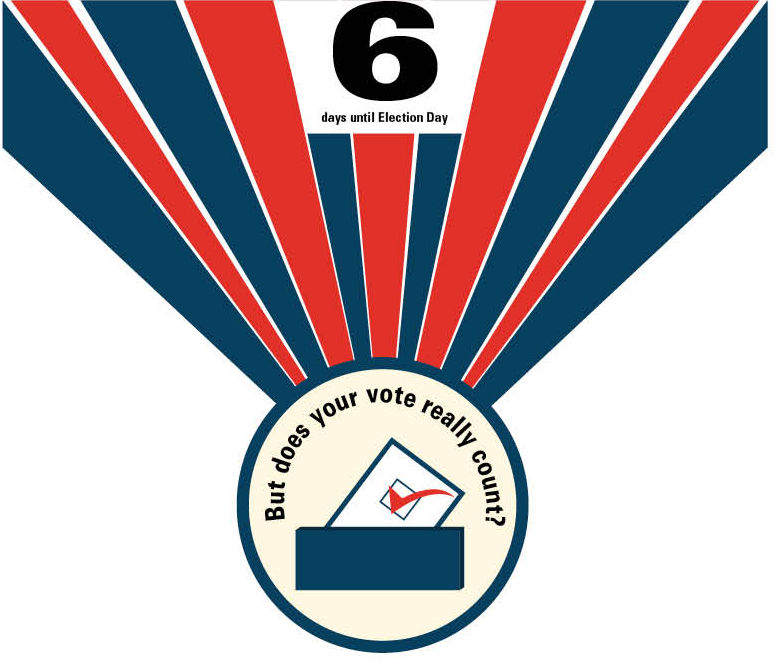To vote or not to vote: debates on whether your vote counts
November 2, 2016
Each presidential election, people ranging from government officials like Barack Obama to celebrities like Robert Downey Jr., create public service announcements, urging the voting-age population to cast their ballots on Nov. 8.
Despite these efforts, the United States has one of the lowest voter turnout rates of any developed nation at 53.6 percent in the 2012 presidential election, according to the Pew Research Center.
The U.S. Census Bureau conducted a study on these voters from 2012. Among the people not voting, 16 percent said they chose not to because they were “not interested” or “did not like candidates or campaign issues,” implying that their one vote will not affect the overall election.
David Wiltse, political science assistant professor said in U.S. presidential elections, citizens cast their ballots at voting locations in states across the country, and those votes then determine the way in which each state’s electoral votes are cast.
Each state has a different number of votes in the electoral college based on the state’s population. South Dakota has three electoral votes, the lowest amount any state has in the electoral college.
“When it comes down to it, voting is not particularly rational. The probability of actually changing an election with my one vote is next to nothing,” Wiltse said. “What gets people to vote is that we understand the value in casting a vote and taking part in a democracy when people in other countries don’t have the same opportunity.”
But for some potential voters, there is a feeling that none of the candidates would be able to represent their interests well.
“It’s very strange to see the candidates attacking each other like how they have been doing. I think they should be more focusing on things that are important to the voters,” said Sajan Karki, freshman mechanical engineer from Nepal.
Karki came to SDSU’s campus from Nepal to study mechanical engineering this year.
Even if Karki was American, he said he wouldn’t want to vote this year.
Kristen Witchey, deputy finance officer of the Brookings Finance Office, works to register voters for the upcoming election and process their ballots.
“I do think that it’s important for people to understand that there is more on the ballot than the presidential candidates,” Witchey said. “The 10 nonpolitical measures on the ballot have a direct impact on our local residents and our state as a whole.”
These 10 measures include issues of decreasing minimum wage, reforming campaign finance and lobbying and establishing nonpartisan elections. South Dakota senators and representatives are also on the ballot for respective districts.
In addition to a lack of knowledge of these issues, studies show college students struggle to find the time to exercise their voting rights. Among the non-voting people in the 2012 election, 19 percent cited the reason, “too busy, conflicting schedule,” according to a Census Bureau study.
Freshman nursing major Kylie Krcil said she completed her voter registration forms to vote in South Dakota, but she became busy and the deadline to submit those forms passed on Oct. 24. She is now unable to vote in this election.
“The only one really pushing me to vote was my mom and I didn’t really see many of those public service announcements (PSA) to register to vote,” Krcil said. “I think it’d be better to do more of that kind of push on social media. I think I definitely would’ve been reminded more to register.”
Voter turnout for 18-30 year olds in South Dakota in the 2012 presidential election was about 36 percent, according to South Dakota Secretary of State Shantel Krebs. To increase the amount of these young voters, South Dakota has conducted PSAs through radio, TV, newspapers and social media outlets like Facebook and Twitter since September, Krebs said.
But within the 2016 presidential race, there have also been claims that the outcome may already be determined because higher powers have rigged the election.
“That kind of massive fraud on that scale is just virtually impossible and there’s no way that that could be going on without someone finding out about it,” said Wiltse.
Christopher Tiernan, sophomore theatre and nursing major, said he plans to vote in his home state of Minnesota for this year’s presidential election, but says he doesn’t feel excited for any candidate in the election.
“I feel like everyone uses the phrase ‘lesser of two evils’ when they’re talking about the person that they’re going to vote for,” Tiernan said. “But I know it’s still important to voice your opinion. This is going to be the first time I actually vote in an election.”
























